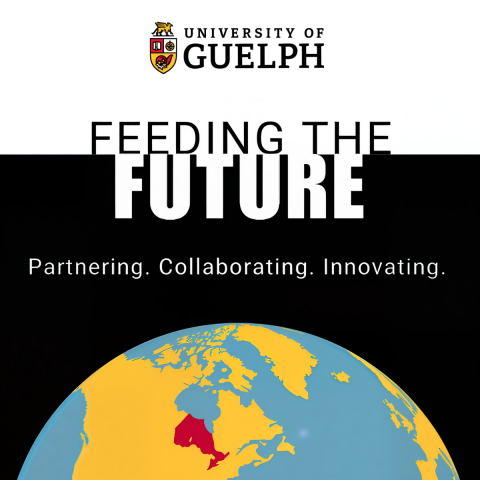
By Cate Willis
A new report captures key ways the University of Guelph can help strengthen Ontario’s agri-food sector and position the province as a global leader through innovation, collaboration and infrastructure.
The report showcases findings from the Feeding the Future initiative’s province-wide, summer 2024 listening tour, where more than 300 industry leaders, farmers and academic partners talked about current challenges and opportunities within Ontario’s agri‑food system.
This engagement process sought to assess Ontario’s agri‑food sector, reflect on its legacy and envision U of G’s role in shaping its future. At the heart of this initiative was the critical question:
How can U of G help make Ontario’s agri‑food sector the best in the world?
Findings from the Feeding the Future Report
The report identifies five priority areas where U of G can lead action: industry collaboration, applied research, commercialization supports, workforce development and modern infrastructure.
By focusing on these areas, the University and its partners will work together to benefit farmers, agri-food businesses and communities while helping Ontario address global challenges such as climate change, supply chain disruptions and shifting trade dynamics.
Findings showed that conducting applied research in areas such as climate-resilient crops, sustainable production, precision farming, and digital agriculture is critical for boosting productivity, managing risks and advancing the adoption of new technologies.
The report also emphasized the need to prepare the next generation of agri-food leaders to enter the workforce through co-ops, internships and professional training. It also highlights the importance of innovation hubs, commercialization support and partnerships between industry, government and academia for faster application of new knowledge and technologies across the sector.
“These priorities reflect what we heard directly from farmers, industry, and communities across Ontario,” says Dr. Shayan Sharif, interim vice-president (research and innovation). “By focusing on collaboration, research, talent and infrastructure, Ontario’s agri-food sector will remain resilient, innovative and globally competitive.”
Listening, Learning and Leading Ontario’s Agri-Food Sector
Stakeholders who participated in the process included farmers, industry leaders, government officials, commodity groups, researchers, alumni, and students. Listening posts were held across the province in Guelph, Elora, New Liskeard, Emo, Winchester, Ridgetown and Prince Edward County, and at events such as Canada’s Outdoor Farm Show and the Royal Agricultural Winter Fair.
The input collected through one-on-one interviews, focus groups, kitchen table meetings, surveys and conversations at agri-food events was synthesized into key findings and opportunities for U of G to lead research, training and partnership efforts.
While the report sets the foundation and identifies priorities, U of G’s next step is to move from listening and visioning to concrete actions.
“The insights from this report highlight where we can make the greatest impact,” adds Sharif. “Our next step is to put these ideas into practice – strengthening partnerships, accelerating innovation, and ensuring that Ontario’s agri-food system continues to lead on the world stage.”
Read the Feeding the Future report.